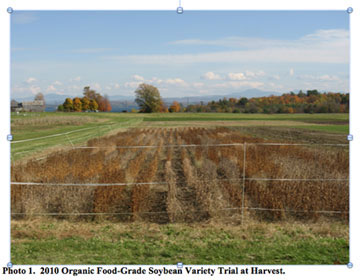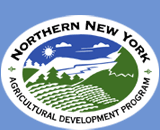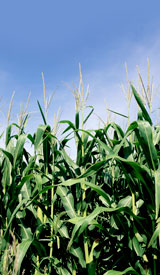April 8, 2011
Michael H. Davis, Cornell EV Baker Agricultural Research Farm Manager,
518-963-7492; Michael Carr, Vermont Soy, 802-472-8500; Elizabeth Dyck,
Organic Growers’ Research and Information-Sharing Network, 607-895-6913
Northern NY Small Grains Trials Support Opportunities for NNY
Agricultural Economy and Local & Heritage Foods Production

Willsboro, NY -- North Country farmers, bakers, and business owners
interested in local, heritage and organic foods are reaping the benefits
of research conducted at the 352-acre Cornell University E.V. Baker
Agricultural Research Farm located along the Lake Champlain shoreline in
Willsboro, NY. Northern New York Agricultural Development Program
2009-2010 Small Grains and Food-Grade Soybeans Variety Trial report data
recently posted online and available from Cornell Cooperative Extension
offices identifies crops well-adapted to regional growing conditions and
processors’ specifications.
“The buy-local, heritage, organically-grown food movement has created
increased interest by millers, bakers and consumers in regionally-grown
and regionally-processed heritage wheat and food-grade soybeans,” says
Baker Farm Manager Michael H. Davis. “Finding varieties with solid
agronomic characteristics that are well-adapted to the Northern New York
regional growing conditions is an essential step toward a profitable
cropping season.”
The report in the Field Crops section of the www.nnyagdev.org website
includes results for 21 spring wheat varieties, 15 winter wheat
varieties, 11 heritage wheat and nine modern wheat varieties, seven
emmer wheat varieties, and 22 commercially-available food-grade soybean
varieties.
Elizabeth Dyck, Coordinator of the Organic Growers’ Research and
Information-Sharing Network (www.ogrin.org) notes that Northern New York
was once known for high-quality wheat production and says the research
managed by Davis is “making a real contribution to reviving this
tradition in the region.”
Davis partnered with Dyck to evaluate several heritage varieties of
winter wheat and the ancient grain emmer at the Baker Farm. The heritage
varieties, grown in the Northeast 80 to 130 years ago, were obtained
from Dr. Mark Sorrells’ breeding program at Cornell University. Steven
Zwinger of North Dakota State University supplied spring emmer wheat
varieties for trial.
“Several heritage wheat varieties have shown distinctive taste and
excellent baking qualities. Emmer, also known as faro, is in increasing
demand by consumers for its delicious taste as a cooked grain and in
flat breads and pasta. The Northern New York trials at the Baker Farm
provide invaluable information to farmers on which of these potentially
high-value varieties to grow and how to manage them,” Dyck says.
Champlain Valley Milling in Westport, NY, produces “all-New York” whole
wheat and white flours. It uses wheat, including one ancient variety,
grown in Northern New York.
Champlain Valley Milling owner Sam Sherman, says, “The on-farm research
carried out in Northern New York is a critical component in developing a
high quality and steady supply of wheat for processing into flour for
commercial and consumer bakers. The challenge is to get everyone growing
the same variety for consistency.”
Vermont Soy in Hardwick, Vermont, is one food-grade processor that is
creating demand for organically-grown soybeans.
“We are interested in the Northern New York-grown beans and are looking
at the research trial data to identify beans that can be
organically-grown with good color and taste. We currently buy beans on
the open market, but see future opportunities to contract with growers
to produce a desired variety of bean that has done well in the regional
trials,” says Vermont Soy Business Manager Michael Carr.
Davis says, “Northern New York farmers have considerable experience
growing animal grain-type soybeans and could enhance their profit
potential by incorporating food-grade soybeans into their crop
rotations.”
Davis adds that the multiple-year trials at the Baker Farm allow for
evaluation of the best growing practices, such as tilling and soil
fertility, as well as testing for high-quality yield potential for the
various crops under a variety of weather conditions.
“Finding varieties with solid potential for yield, disease resistance,
quality, and adaptation to the Northern New York growing conditions is
an annual challenge for all field crop producers,” Davis says. “Field
testing here helps us develop advantages, such as cost-effective seeding
rate guidelines, that can help farmers begin their own plantings with a
greater opportunity for success. Their success, in turn, can help supply
and grow our local food processing industry.”
The NNYADP-funded research also tested heritage winter wheat seeding
rates View Results Here.
#



